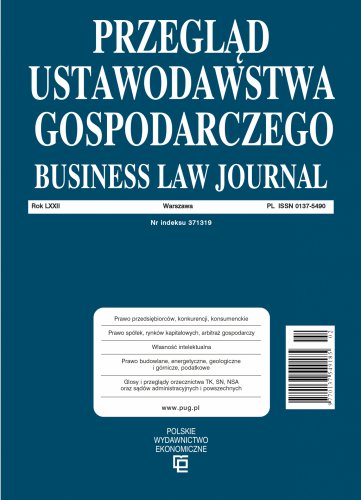Robo-advice as example of fin-tech — problems of regulating and operatin
The service of automated financial advice (robo-advice) belongs to financial innovations in the area of retail customer service and is provided by entities from the financial technologies segment. This service usually concerns investment consultancy and involves the use of algorithms and artificial intelligence to collect information from the client and propose a solution corresponding to the client's risk profile. This method of service reduces the costs of consultancy services and minimizes or completely abolishes the minimum investment amount required by the adviser. The homeland of robo-advice is the United States, where the largest market is, but robo-advisers are also present in Europe. The article presents the most important aspects related to the definition, regulations, operating, size of the world and Poland's market and it forecast until 2023. The presented analysis shows that the most likely solution in the future is the hybrid model, in which a traditional financial advisor responsible for shaping customer relations uses robo-advice tools for customer service. The challenge for the regulator and financial supervision will be the introduction of such standards that will ensure the security of economic trading participants, and on the other hand will not be too restrictive and inhibit the development of this innovative segment of the financial services market.
References
Bibliografia/References
Literatura/Literature
Abraham, F., Schmukler, S. L., Tessada, J. (2019). Robo-Advisors: Investing through Machines. Research & Policy Briefs From the World Bank Chile Center and Malaysia Hub, 21, February.
Baker, T., Dellaert, B. G. C. (2018). Regulating Robo Advice Across the Financial Services Industry. Faculty Scholarship at Penn Law. 1740. https://scholarship.law.upenn.edu/faculty_scholarship/1740 (13.07.2019).
Ciukaj, R. (2019). Wpływ sektora FinTech na rozwój rynku bankowego — doświadczenia niemieckie. W: E. Miklaszewska (red.), Banki w nowym otoczeniu społecznym, gospodarczym i technologicznym. Warszawa: Poltext.
Deloitte (2016). The expansion of Robo-Advisory in Wealth Management. Deloitte, 8.
Dziawgo, T. (2018). „Robo-advisory” redefiniuje doradztwo finansowe. W: Co zmienilibyśmy w Polsce i Europie, Eseje członków Akademii EFC. Gdańsk: Akademia EFC.
European Banking Authority (2017). Discussion Paper on the EBA's approach to financial technology (FinTech), EBA/DP/2017/024 August. https://eba.europa.eu (1.03.2020).
European Securities and Markets Authority (2016), Wytyczne dotyczące oceny wiedzy i kompetencji. 22.03.2016, ESMA/2015/1886. https://www.esma.europa.eu (1.05.2020).
Fein, M. L. (2015). Robo-Advisors: A Closer Look. https://ssrn.com (5.03.2020). https://doi.org/10.2139/ssrn.2658701
Jajuga, K. (019). Czy fintechy zmienią oblicze rynku finansowego: szanse, możliwości, barier. Wrocław: Uniwersytet Ekonomiczny we Wrocławiu.
Milic-Czerniak, R. (2019). Rola fintechów w rozwoju innowacji finansowych. W: K. Marchewka-Bartkowiak (red.), Innowacje i nowe technologie w finansach. Studia BAS, 57(1). https://doi.org/10.31268/studiabas.2019.03
Rogowski, W. (2017). Świt wirtualnego doradztwa finansowego (robo-advisor). e-Mentor, (4). https://doi.org/10.15219/em71.1315
Sinha, A. (2016). White Paper: Increasing the Efficiency and Effectiveness of Financial Advice with Robo-Advisors. INFOSYS.
Ślązak, E. (2017). Systemy zautomatyzowanego doradztwa finansowego. https://viem.viennalife.pl (23.07.2019).
Ślązak, E. (2018). Algorytmy zautomatyzowanego doradztwa finansowego (robo-advisor). W: A. Gospodarowicz (red.), Bankowość elektroniczna. Warszawa: C.H. Beck.
Szpringer, W. (2017). Nowe technologie a sektor finansowy. Fintech jako szansa i zagrożenie. Warszawa: Poltext.
Tanda, A., Schena, C. M. (2019). FinTech Activities and Business Models: Analogies and Differences with the Traditional Financial Channels, Fin-Tech, BigTech and Banks. Digitalisation and Its Impact on Banking Business Models. Palgrave Macmillan. https://doi.org/10.1007/978-3-030-22426-4_2
Wachnicka, A. (2019). Usługi finansowe w dobie cyfryzacji — aspekty prawne a tendencje socjodemograficzne. Przegląd Ustawodawstwa Gospodarczego, (4). https://doi.org/10.33226/0137-5490.2019.4.2
Strony internetowe/Websites
www.cfapoland.org (5.03.2020)
www.knf.gov.pl (5.03.2020)
www.statista.com (5.03.2020)

